Text
In regard to Lain's confidence boost throughout the episodes, I think it might be a sort of commentary on how social media has affected people. What with the idea of the keyboard warriors and the shield of anonymity, Lain might fall into this category for part of the show, seeing as how she had so much power in the virtual world that she lacked outside of it or in her own home.
Post for 4/24
I’m really glad that we got to watch Serial Experiments Lain for this semester’s last class. It was a cool show! The anime’s art style is unique and I think the bleak backgrounds really added to the atmosphere. It’s very minimalist, but it works wonders for this show.
I was sometimes confused by random, short sequences that the plot didn’t really explain. For example, there was a guy who was chased around and murdered (?) by a little girl, but I don’t think the show ever clarified who either of them were. Then, some guy killed (?) that girl in a game called Phantoma in the Wired using his handgun (no pun intended). Also, where is Mika? Can someone check up on her?
However, the moments when I could comprehend the show were good. I wonder if the version of Lain that is confident is a reference to how the shield of anonymity makes people lose their expressional filter when they’re talking on the internet. Also, it was kind of annoying to see Lain’s family basically neglect her well-being, except for her father to some extent. I did end up watching the very last episode of the anime, too, and it was nice to see her father talking to her in limbo.
My favorite episode was the last one we were assigned, where Arisu reminds Lain that she is human and stops Eiri’s plan from coming to fruition. It was wholesome to see Lain trying to comfort Arisu and vice versa, despite Lain letting her see man-made horrors beyond her comprehension, going so far as to erase herself from everyone’s memories to stop their suffering. It felt like Lain was more human than she ever was during those moments. Actually, I think they intentionally made it ambiguous whether Lain is a human, homunculus, program, or a God. In any case, it was awesome to see her putting Eiri, a false God, in his place. By all means, own that fraud!

Image of Lain from https://pen-online.com/culture/god-is-in-the-wired-serial-experiments-lain/.
5 notes
·
View notes
Text
4/24/24
Sorry this one is a little bit later than usual, I had some family issues that took me out of commission for a day. But now we're back and we're here for our last blog post of the semester. And for this one we got a doozy. I got to watch episodes 1, 4, 7, and 12 of Serial Experiments Lain. I found this really interesting as it had a unique art style, cool background choices, and a very minimalistic animation style. The story on the other hand is the complete opposite. This tale follows Lain as she goes through the Wired, a virtual world that allows its users to essentially abandon the physical world and live in another reality for a time. I feel like this idea of the virtual world and its effects on the psychologies of its characters is something that quite a few anime really home in on. Maybe it's because of how technologically focused and advanced Japan has become, or it might just be commentary on the overall world and how social media has changed society.
As far as characters go, I felt that Lain was very interesting as she was shy and introverted but through her various experiences we get to view her come out of her shell and eventually accept who she actually is. However, I also can see the tragedy in her character as she comes to learn about her true nature, that she's not actually a human being, and in learning about the tragedies that mankind causes and viewing some of those horrors, she has to make multiple difficult decisions for the greater good. Overall, I felt that these episodes were very interesting and great way to end off the semester.
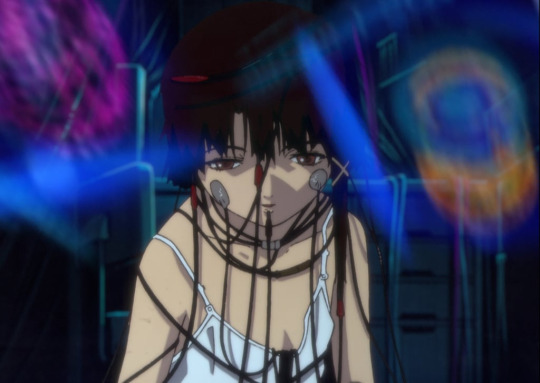
0 notes
Text
I also got some Freudian vibes from this movie. And while I completely believe that Freud was way off with most of his theories and proposals in psychology, I do find this exploration of one of his ideas to be super interesting. It made it sort of hard to watch as everyone was at their most vulnerable and naked when in the shared dream, unable to hide anything.
4/22 Paprika
Oh boy and I though Perfect Blue was confusing...
I do wanna applaud the director for doing a great job blurring the point between dream and reality to the extent he did because a whole driving plot point is being in other people's dreams BUT maybe I just lack the aptitude for deeper psychological themes because I was so incredibly lost.
With Perfect Blue you do get the same sort of dazed questioning what's going on feeling but it's not so jarring to where you struggle to understand like I felt this movie was.
If you subscribe to the Freudian ideology where dreams are repressed wishes that reveal more about a person, the idea of a device being developed that allows you to see someone else's dreams as a way of helping them could be groundbreaking however as was shown in this I feel the kind of invasiveness of this could only lead to bigger consequences in the future.
I didn't really like the way Dr. Chiba was fat shaming Tokita and also wasn't a huge fan of how she kept blaming him for EVERYTHING. Furthermore, I found the scene where Paprika is like ripped open to reveal Dr. Chiba on the inside- was really oddly sexual and uncomfy. In a lot of the odd dream sequences there were dolls or other child-like items so having these random groping scenes or someone getting shot repeatedly was a weird juxtaposition. As for like deeper analyzable themes I'm struggling a bit on that so I'm looking forward to hearing others thoughts in class.
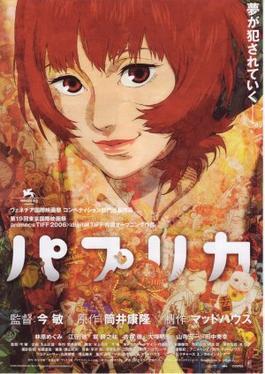
4 notes
·
View notes
Text
4/22/24
For one of our final classes, we got to choose to watch the anime movie Paprika. Paprika felt like it drew some ideas and inspiration from Inception, although I didn't check when either of these movies came out so it could be the other way around. However, I can definitely see a connection either way. The idea of the shared dream between multiple people and exploring the alternate realities that this dream allows them to experience was something very unique and interesting to watch.
I felt that this movie was focusing on the subconscious and also drew a ton of its themes and ideas from Freudian psychology. For instance, the usage of dreams to explore different realities and to delve into the subconscious thoughts and wants of an individual. We sort of see this through Paprika and Dr. Chiba, at least I did. Paprika, to me, served as an outlet for Dr. Chiba's inner most wants, while simultaneously serving as an outlet for everyone else's inner most desires and lusts. And the fact that this was a giant shared dream would, in Freudian Psychology, mean that everybody was showing off their inner most self, they were at their most vulnerable and had nothing they could truly hide from each other. Overall, I found this to be thought provoking, interesting, and unique.
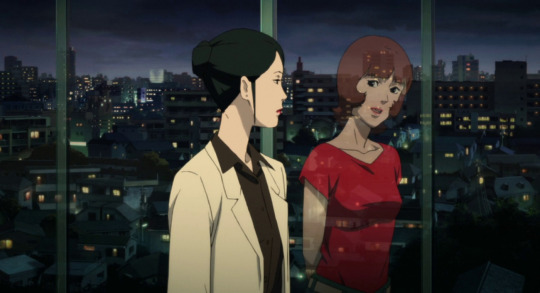
1 note
·
View note
Text
I like how you touched on the power dynamics in the Hopper Fly colony with the queen and her ceremonial position of power. I didn't see the commentary on the patriarchy until you mentioned it and thought it was a great way to interpret it, as I thought it was just speaking on Japan's historical usage of puppet rulers in the form of the Emperor.
Shin Sekai Yori (15, 21, 24, 25)
In episode 15, we can see Squealer and his species worry about becoming extinct and therefore try to exploit the queen. They knew they were smart and believed that they deserve some power, yet the queen had so much and ruled over them unfavorably. I feel like this represents governments/powers throughout history: the government exploits or neglects its citizens and, therefore, the citizens retaliate, protest, etc. at the power's expense. The citizens come together to build power and make changes to the government/power. Squealer and his species worked together, forming a union, and tried to negotiate, yet they ended up trapping her and still exploit her for the benefit of the colony. This is similar to when the newly formed government reduces the power of the leader, making them instead a public figure (kind of like the president or prime minister). Then we see things like war prisoners, enslavement, imperialism/colonialism in episode 21, which we see in history during an overthrow of rule as well. In the last episode, the Squealer talks about how change is necessary, which I do think is true, but that the sacrifices would have been worth it if they had won, which I disagree with: in the end, people lost their lives. War and violence are the problem (I can see why Squealer thought they needed to resort to it, especially when they tried to propose equal rights, but to continually hurt the Queen and other species? That does not seem very moral). In the end, it is quite a morally grey area when you consider all things, though.
I think there is also commentary on patriarchy. The Robber Fly colony thinks that the queen's only job should be childbirth, while the "smart" ones should have the power. The queens are stuck inside (domestic duties, trapped in the house) while the men (I think) are free to roam and rule. This also reminds me of Japanese history. There were queens with power an extremely long time ago in Japan, like Queen Himiko, that people at first accepted as ruler; however, men soon believed they deserved the power, labeling women that ruled as evil (people believed that Queen Himiko had magical powers that she used for evil purposes as well), resulting in men ruling Japan. Then, they use violence, blaming the Goat Moths for shooting an arrow when they used violence first. This represents the common opinion that men often resort to violence more compared to women, like starting something as small as fights or as big as war.
Now, something that I find quite disturbing is how kids ended up having a child?! Like I think they are 14? Definitely an interesting plot by the storywriter - I wonder what the idea was behind that?
I think that overall, this anime is a commentary on power, whether its a ruler, and man and woman, magical powers, or the responsibility that comes with it.
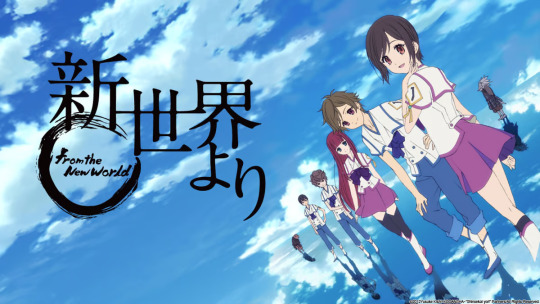
8 notes
·
View notes
Text
4/19/24
Today I got to continue on through 4 more episodes of Shin Sekai Yori. The episodes were 15. 21. 24. and 25 this time. These episodes seemed to take a turn and focus more on speaking about power dynamics and how they affect society at multiple levels. For instance, with Squealer and his people, there is the battle of power between them and the queen they serve as they attempt to negotiate and change their society for the better, but are unable to successfully do so due to the established power that the queen already possessed, instead creating a new power system that is nearly identical to the old one, just with them on top. I feel like this speaks on how Japan has often faced political change with the different dynasties and forms of government throughout its history and even in the modern day. Yet it also speaks on how futile most of these changes were as they often just reverted back to the practices of the previous regime, thus leading to a new group to come and attempt to create change.
Additionally, I feel like this also talks about the constant usage of puppet rulers throughout Japan's history. As the emperor was the sole face of power in medieval and imperial Japanese culture, many officials and dynasties would use him as puppet, a simple face for the people to associate their government with, while others in the background were truly running things. We see this in the anime when the Queen of the Robber Fly colony is relegated to staying inside, doing simple ceremonial duties such as bearing the children to keep the colony alive, while other ants controlled things from the background while still publicly acknowledging her as the "Queen". Overall, I felt that this shift from the other episodes was interesting, even if it was not where I saw it going.
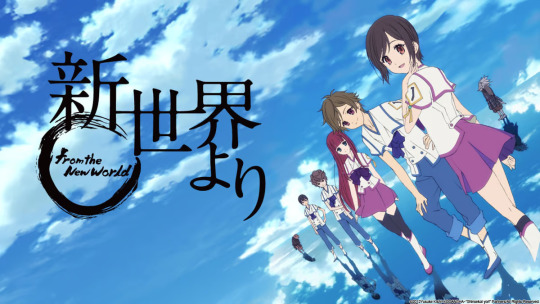
0 notes
Text
I also liked how the anime delved into the pasts of these people who do horrible things, and while it doesn't attempt to justify them, it offers reasons as to how their psychological state of minds came to be.
Post for 4/17
“Wild Child” was an unsettling read. I was curious about the Kobe serial killing incident, so I looked it up, and it was every bit as disturbing as I expected. I took a forensics class in high school and we explored a myriad of serial killer cases, so hearing about Boy A’s case really brought me back to those times.
I like horror stuff so Shin Sekai Yori was an interesting watch! It was a bit confusing with all of the lore and episode skipping, but I think I got the gist of it. I’m guessing that the first PK user who committed crimes named Boy A was an allusion to the real Boy A that was mentioned in “Wild Child.” I’m wondering what the Death of Shame that prevented people from stopping Boy A could be an allusion to. Maybe it represents the former Japanese law in place that prevented minors under 17 from being incarcerated? Or maybe it was just empathy that prevented people from wanting to hurt minors? Also, regarding kids who become ogres such as the kid named K, I think the anime did a good job of showing what leads them to doing horrible things – not that their actions are justified, but it’s hard to overlook the probability that many of those kids grew up as victims in some regard. The anime portrayed these kids as neglected, vulnerable, and deeply afraid of the people around them, which I feel is pretty realistic. Of course, the Education Committee uses a twisted approach of destroying them before they have actually done anything (which reminds me of Psycho-Pass). Right now, I sort of get what message they’re trying to tell for ogres with Larman-Krogeus Syndrome, but Karmic Demons with Hashimoto-Applebaum Syndrome are still a mystery to me. I look forward to what we come up with in class.

Image of Saki from https://www.crunchyroll.com/watch/GY5VJKWPY/torchlight-in-the-darkness.
4 notes
·
View notes
Text
4/17/24
Today I got to read an excerpt from "Wild Child" and watch a few episodes from Shin Sekai Yori. "Wild Child" was an interesting but unsettling read for me. It told the story of the Kobe serial killing incident and the person "Boy A" who was involved with this case. I found it interesting as I am a criminology major and this brought a case to light that I hadn't gotten the chance to study and enjoy learning about yet.
Now with Shin Sekai Yori, I found this to be a very convoluted and complicated show to watch. The fact that I found it convoluted and confusing is most likely due to the fact that I had to watch episodes out of order and without context, which in such a lore heavy anime makes things seem very out of place and confusing when they're actually where they're supposed to be. I appreciated the real life allusions throughout this anime as well. With the Boy A in this being connected to the real Boy A and their crimes. But also with the more discreet allusions. Allusions like the Death of Shame and its commentary on the former Japanese laws that overly protected minors from facing justice for their crimes. Finally, I liked how the villains and killers weren't one dimensional in this series. With K, there was a representation of how real monsters can be made. Many people who act criminally often do so due to their pasts and the abuse that they suffered. It's a psychological cycle that can cause someone to go from normal and sane to entirely blood-lusted, crazy, and psychologically broken.

0 notes
Text
I completely agree that the ending was really abrupt and felt out of place compared to how seamless the rest of the anime was. I wonder if there were any external issues that caused this, or if this was just some sort of creative choice meant to leave things up to interpretation.
Post for 4/15
The last episode of Eden of the East felt like it was something straight out of an action movie. The part where all of the NEETs worked together to plan out how to intercept the incoming missiles within seconds is like a visualization of people on the internet using Reddit to track down a piece of lost media, or something along those lines. In general, the appearance of the naked, angry NEETs were really funny to see. Something about the imagery of 20,000 of them simultaneously yelling and jumping out of shipping containers was so surreal. The scene where they immediately dispersed to the sides of the room when women were passing through, like vampires to garlic, was also really funny. “Don’t worry, they’re probably only interested in 2D” completely caught me off guard, too.
I don’t think I’m the only one who didn’t expect the ending to be so abrupt. I thought that I had watched the wrong episode at first but it really turned out to be the last one. I searched it up and apparently there’s a couple of sequel movies that follow the anime series. I kind of wish we were assigned to watch those for class because I feel like there are still a lot of loose ends that remain. What does Takizawa intend to do as the King of Japan? Who is the real Supporter? Is Ato still out there? There’s still so much to be explained.
Something that relates to our previous in-class discussions was Itazu’s belief that conspiracies emerge when a nation is weak. When there isn’t a physical higher power that enacts power onto the common people, those people start to make things up to fill in that gap, such as religion or conspiracies. Perhaps this is why Takizawa wants to become the King of Japan so that people aren’t misled by falsehoods any longer?
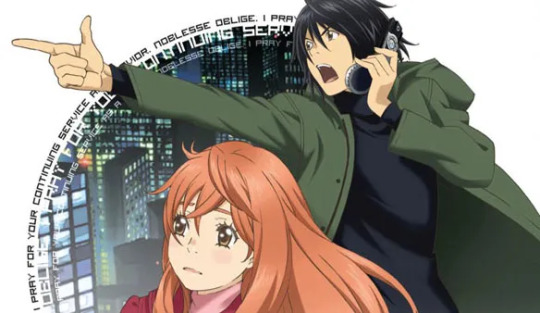
Image from https://www.indiewire.com/criticism/culture/anime-review-eden-of-the-east-the-premium-edition-122333/.
4 notes
·
View notes
Text
4/15/24
Today I got to watch four more episodes of Eden of the East including the series finale. Personally, I felt that the anime ending was a little abrupt, I don't know if there were problems with the studio or the creator when this was being finished, but it sort of felt like the original Bleach manga ending where there were tons of loose ends and a lackluster finish.
I did however enjoy learning and interpreting some of the messages in this anime. I feel that the way they were implemented was clever. For instance, one of the messages focused on arguing the idea of downsizing Japan by getting rid of the useless and those who wouldn't give up their own rights to better the overall nation. I felt that this message was very cleverly displayed throughout the anime. After all, one group of these useless people who they wanted to get rid of, the NEETS, ended up being instrumental showing ingenuity and quick thinking in a stressful situation when they collaborated as a group to intercept the missiles that were bearing down on them and the mall.
This directly confronts and contradicts some of the extremists in modern day Japan who believe that Japan has to downsize to only those who would put it back to its Imperial era roots, as they believe this was the best version of Japan. I touched on this in my last paper, which was focused on Zipang and its messages against the extremist values of Imperial Japan as I believe that while it is a minority, it is still a dangerous minority, and I believe that addressing it through this was a smart way to disprove their ideas. Overall, I feel that Eden of the East was a good watch with a solid overall message.
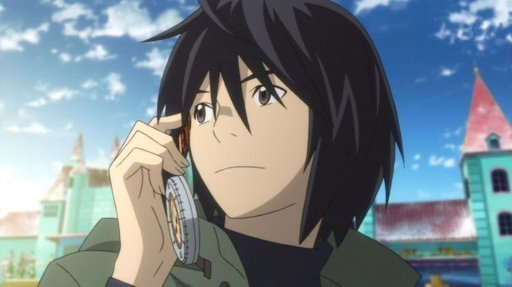
2 notes
·
View notes
Text
I agree with your viewpoint on the broken English and the unrealistic nature of what all was happening throughout Eden of the East. I felt that the broken English was out of place and often off-putting for me and threw me off during the scenes where it came up. Additionally, I too felt that the fact the Morimi went with the stranger who flashed her was entirely unrealistic and highly unlikely to ever happen in reality, which is where I viewed this anime to be based.
Post for 4/12
Eden of the East was an interesting watch. It was kind of bizarre to hear people speaking non-broken English in anime and even more bizarre that the Americans understood Japanese with no issue (but weirdly wholesome). I’m actually glad that they laid out the rules of the game played by the Selecao in one of the first episodes because it probably would’ve taken me a while to figure it out had they not explained it in a straightforward way. For some reason, I can’t take this anime too seriously because it feels a bit unrealistic. Morimi just trusts a stranger who flashed her, the police view their jobs as a joke, people aren’t taking any big measures to investigate or stop the Selecao, and the Selecao are so far above the law in every way possible with no meaningful backlash or regulation.
Regarding “Work Culture” by Mouer, it was disappointing yet not surprising to learn that postwar conservatives dismissed leftist activists, who demanded a raise in minimum wage and guaranteed human rights, as foreign individualists who did not belong in a collectivist Japan. Honestly, that is really one of the weakest excuses that can be thought of, and what makes it crazier is that the conservatives said this AFTER the war and AFTER everyone realized the dangers that collective, blind faith in their government’s right-wing propaganda could bring. I don’t know how anyone would actually believe them, especially in regards to something as important as giving people decent lives. It’s clear that their motive was to save money on both distributing reasonable salaries and implementing safety guidelines/enforcement, which are notoriously expensive to implement in many cases. What exactly was their argument? “Because we’re a group, you must be honored to earn less money (and effectively save us money but ignore that part) and be prepared to risk your life at all times!” Who would fall for this, genuinely?
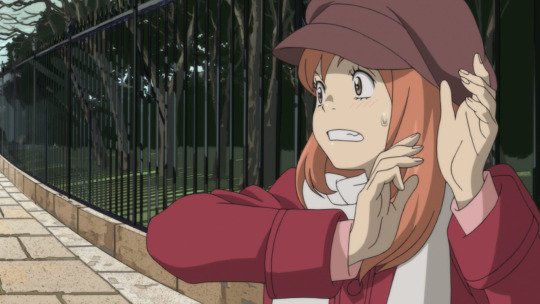
Image of Morimi from https://www.amazon.co.uk/Eden-East-Season-1/dp/B0CH38SYBW.
8 notes
·
View notes
Text
4/12/24
For today, there were two assigned pieces to watch and read. The first of which was the anime Eden of the East. This anime seemed to be a bit of a joke, or at least it was in my eyes. Its plot was largely unrealistic in a setting that seemed like it was supposed to be realistic. For instance the broken English throughout the show felt weirdly misplaced, like in most anime when there's English it is usually one or two words or phrases that stand out apart from the rest of the dialogue. It's used as a form of comedy, however in this anime it felt like it was an attempt to be serious and that just threw me off. Additionally, an instance in which I felt that the characters weren't realistic when the world was supposed to be someone realistic was when Morimi simply trusted a stranger who had also flashed her. That would not happen in the real world unless both people involved had some sort of mental illness or cognitive issue, so it felt out of place.
Now the second work was called "Work Culture" by Mouer. This piece focused on the postwar developments that led to the extreme modern day work culture of Japan. I believe that this is where the extreme senses of duty and nationalism that were found in the military went after Japan essentially demilitarized and changed its militaristic and political culture. Pay stayed low, high amounts of work has stayed expected and has been applauded. Essentially, the idea of the needs of the many outweigh the needs of the few was put to the extreme where the many are the corporations and the few are the workers. The expectation is to put the company before the individual, it is an honor to sacrifice one's pay to help further the goals of the company. Overall, I disagree with this set of reasoning but also see where its coming from in the historic culture.

2 notes
·
View notes
Text
I also saw the different mindsets that were experienced by the modern and imperial soldiers. I felt that this anime was smart with how it compared modern and imperial Japan, while also showing some of the similarities of the cultures that had stuck around in the modern age. Additionally, I think Kusaba's methods were a way of demonstrating the reality that governments often require methods that the population may not be comfortable with facing.
04/10
Zipang P2
It was very hard to piece together a thought process considering the jump for today's assigned episodes, but I will do my best here. Also, I cannot distinguish the characters, despite the art style differences (Tin-Tin eyes vs anime eyes).
After the Mirai was attacked by American planes, the leader's resolve was clearly broken. You can't blame his mistakes on him because pretty much anyone today has never experienced WWII. While there were wars, none were World Wars. Japan after WWII had not experienced true battles, so the scare tactic to frighten with minimal violence was not enough. Even though I'm sure they knew about Japanese kamikazes and suicide missions, I don't think they connected the soldiers of this era had the "die trying" mindset.
Also, we got to understand what the title means to the anime/manga. While yesterday's presenter told the origins of the word "Zipang," hearing it from the characters was just as important. "Zipang" is "Japan" but the original name before it became Japan. Sort of like how "Peking" (if you are unfamiliar, perhaps Chinese food lovers can tell you about the importance and cultural significance of Peking roasted duck.) referred to the capital of China before it became "Beijing." While Western languages do not usually pronounce the words accurately (every language pronounces foreign words a little off, so it's kind of, not really, fair; looking at you, "bao-buns", "lo mein-noodles", "matcha-tea", etc.), how the show interprets Zipang is quite sentimental. Instead of becoming a country shaped by the Imperialist Japanese who do not have the country's best interest or by foreign forces post-war occupation, Zipang refers to a nation governed for the people's lives by people making informed choices in their lives. In a way, it definitely speaks against the State by encouraging a self-governed population, but Kusaba's vision is executed by dark hero's methods that continue to involve killing or manipulating people. In other words, he is acting very un-Jesus-like here.
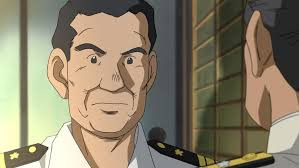
Tin-Tin eyes, ok?
-04/09/24
3 notes
·
View notes
Text
4/10/24
For today, I got to continue through Zipang, the anime that follows modern day Japanese soldiers as they go on their journey through the past confronted with the realities of World War II Japan. Throughout this experience, the soldiers of the Mirai crew are swiftly confronted with the harsh realities of World War II warfare. Due to how the modern world and modern Japan has been shaped, none of these soldiers have experienced combat on the scale of World War II, and when they attempt their tactics such as attempting to frighten off their enemies with light fire, they are swiftly confronted with the difference between modern Japanese military culture, and imperial Japanese military culture.
Now as they continue on with their journey, changing the past and learning from their experiences while knowing the future, they create "Zipang". This "Zipang" is not only the original name of Japan, but also their plan for what to build Japan into. Kusaba decides to create a Japan that is not Imperialist by nature, but is also not essentially demilitarized like modern day Japan. "Zipang" is the middle ground, a Japan that avoided the twin suns being dropped on it, while also not losing its pride. I feel that this part of the anime was essentially pandering to Japanese nationalism. It worked to appease both the conservatives and the liberals of Japan. It's a Japan that is for the Japanese people and culture. However, I also liked how it showed what went down behind the scenes as this government was built. Kusaba ensured that his vision would happen and justified it as the greater good for the Japanese people, by utilizing manipulation, killings, and other deceptive and dark political methods. I felt that this anime effectively pandered to Japanese nationalism, while also ensuring that the viewers are confronted with the realities that comes with this.
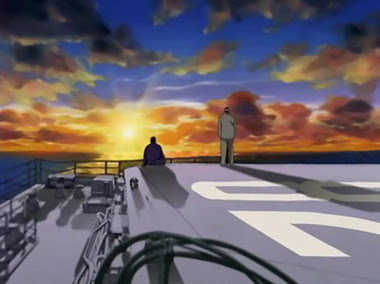
0 notes
Text
I completely agree on how this anime really aggressively tackles the realities of war. I feel that its methods were really smart and clever as it forced the audience and the characters to simultaneously come to terms with the reality of what happened during World War II, instead of glorifying it.
JVC Post #31
ZIPANG!
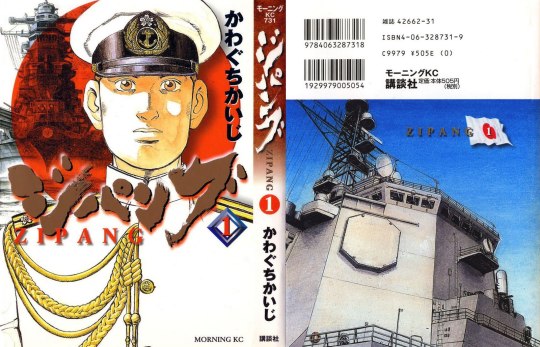
This show was really interesting. I really liked the intro and the outro too.
Can I just say that the premise of this show resembles an episode of The Twilight Zone? The entire time I was watching the first and third episodes, I was thinking "Rod Sterling would probably write a premise like this". It feels like the kind of story you'd find in a novel or a short story rather than an anime, and I find that intriguing.
The show allows modern Japanese soldiers to confront their past in a literal sense, both personally through the lieutenant and also by being transported to the Showa era in the middle of the war. While we've already seen many works that deal with World War 2, this one feels so much more direct. It feels like it's not only putting Japan's nationalistic, totalitarian past on full display, but it's connecting it directly to the modern audience through modern soldiers who struggle to reconcile their motivations with that past.
Kusaka feels like he will become a driving force in the narrative. His presence alone, just like the soldier said when he first boarded, changes everything. He is what anchors them to the era; Him and all his nationalistic pride, strictness, and hope for Japan's future power. It's why he's on the cover too. He's the symbol of Japan in that era.
When they finally arrive to Singapore and they're at the party/ball(?) Kusaka says that the wants to change the 21st century (something that is already happening, as he points out later). This is after he learns of the future peace in Japan and its lack of military power and whatnot. He wants Japan to be a militaristic superpower like the empire dreams of rather than the relatively peaceful country it eventually becomes. Obviously, the modern soldiers have a contrary opinion.
I feel like this is going to become a point of conflict as the plot thickens.
9 notes
·
View notes
Text
4/8/24
For this class we had two different readings and some episodes to watch. The first of these readings was "Sexuality" by Saito. This excerpt focuses on how Otaku and how its sexuality is multilayered and complex, therefore making it different from fetishism or pedophilia. He claims that the otaku culture is a natural phenomenon that has grown due to the fact that children were raised with anime, found these anime girls attractive, and then when they hit puberty, saw them in a sexual light, creating the otaku. Saito claims that the otaku is not an issue so long as it is held in the imaginary realm and not acted upon in the real world with real women.
Next was "Media Effects" by Gauntlett. This piece focuses on the Media Effect Model which states that individuals and society are largely influenced the news and entertainment mass media. It's largely similar to the idea of "video games causing violence". Essentially, our deviant behaviors and our very human nature are largely caused by what we view. Now this journal actually works to discredit this model and I for one agree, for the most part. I agree that this model is incorrect in claiming that our very natures are created and shaped by the mass media, however, I will say that I believe that there is an undeniable influence from the mass media on the overall society.
Finally, we got to watch some episodes of Zipang. Now this anime was heavily focused on thrusting the reality of what imperial Japan was like and what it did during the World War II era. The anime does this by showing the audience Japanese soldiers from today, and demonstrating how they confront their pasts and the previous actions of Japan. Doing this by throwing the soldiers into the past was a genius idea. As it thrust the reality of the war on both the soldiers and the audience at the same time, forcing them both to uncomfortably face the truth of history. This anime also advocates for change and peace while also showing through Kusaka that people must always be vigilant because there is always a small minority waiting to take over and rebuild Japan into what it once was despite what everyone says. It is a battle of new ideas and old.
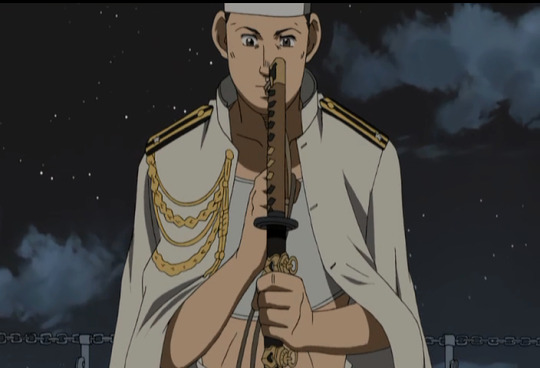
0 notes
Text
I completely agree with your anger and horror at Koboyashi's attempts to just wash over the war as something that was great and not some horrible atrocity that negatively affected all those who were involved in it. You would think he would look at the state of his country and its people after the war and be able to understand that the war did nothing but worsen Japan and the lives of its people in its immediate aftermath.
Post for 3/27
“Neo-Nationalism and the ‘Liberal School of History’” by Kersten makes some compelling observations about the surge of post-war neo-nationalist propaganda in Japan, and the article serves as a good warning before reading Sensōron by Kobayashi. Sensōron was such a disturbing read for me because of its heavy usage of nationalist propaganda. It almost felt like reading a collection of political cartoons, especially in comparison with all of the other more traditional manga that we’ve read so far in this class. The author depicts Japanese people as innocent victims of war who have been unfairly converted into “brainwashees” by America. Putting national pride above all else, Kobayashi completely dismisses any responsibility or accountability that the Japanese government should hold after the war. Instead, he criticizes the anti-war side of Japan for not upholding the same dangerous extent of pride. In one section, Kobayashi focuses on disproving the legitimacy of a series of anti-war photographs. And I get it – some war photographs tend to be more artistically captured to emotionally resonate with people while others maintain the scene as it is to remain objective. Photographers should clarify this detail regarding legitimacy when taking these pictures. However, I couldn’t help but get super frustrated when Kobayashi tried to debunk the photo of the baby being alone in a field of ruins as being fake. Like, okay sure, maybe there were people around the baby who could’ve been the baby’s guardian… but did you completely miss the part where the buildings in the background were completely annihilated? Do you think those buildings were destroyed just so this photograph could be taken? Do you think that just because this particular image was captured in this way means that other babies aren’t being abandoned in the war? Would there really have been such a massive difference if the baby’s parents were in the frame? Kobayashi completely tunnel-visions on one minor detail of the photograph instead of addressing the bigger picture that it was trying to convey. It’s almost like he’s saying “Wow, since this baby might not actually be alone, it means that the victims here haven’t suffered enough! How about you go get some more proof of your suffering before you can convince me that war is bad?” Just because a few images were “fake” doesn’t automatically excuse the Japanese government of their wartime atrocities.
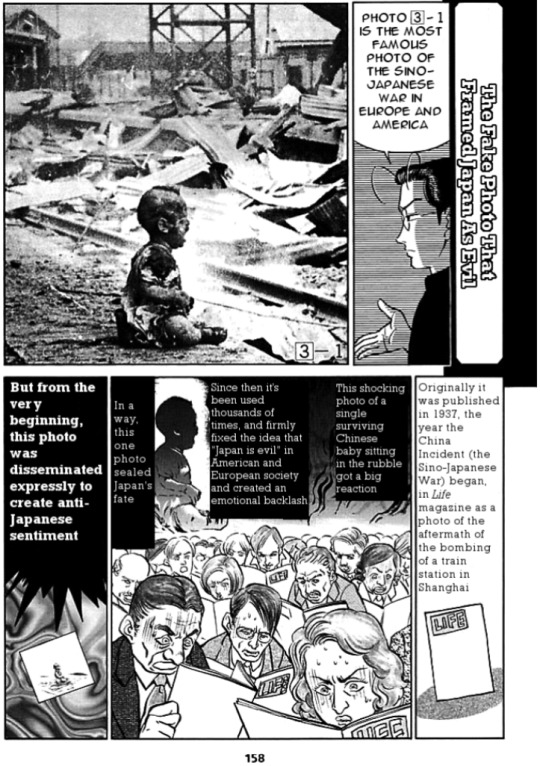
Image of the baby in the field of ruins from Sensōron.
2 notes
·
View notes